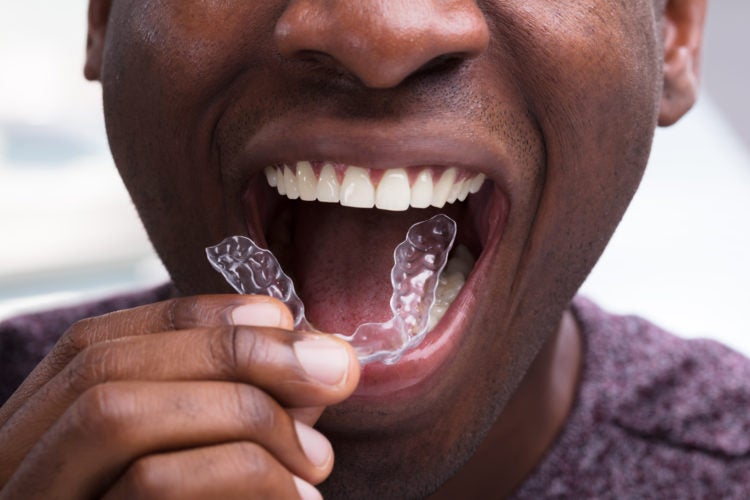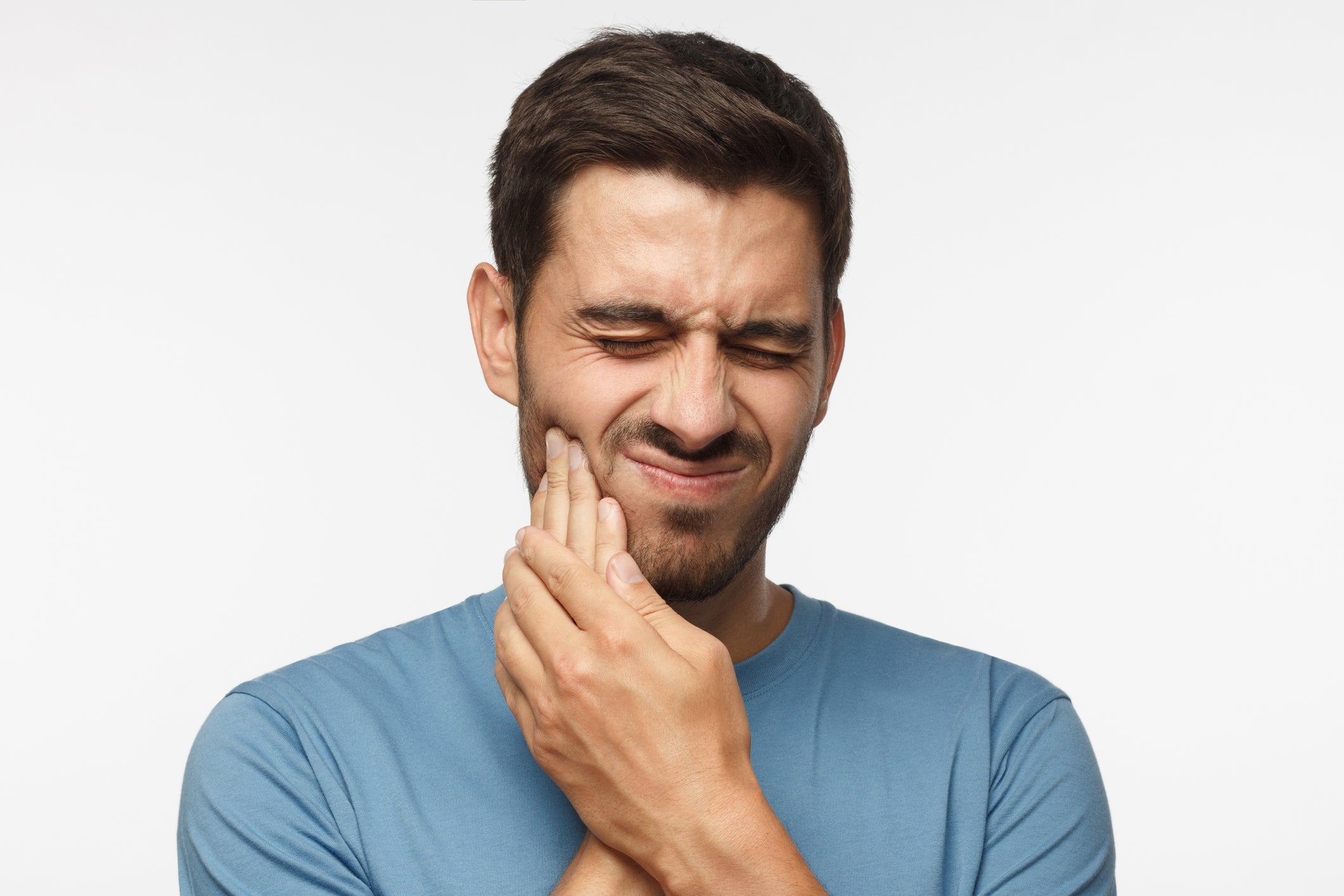-
Invisalign FAQs

Invisalign is a popular treatment for gradually straightening teeth, using clear, removable aligners. It doesn’t involve brackets or wires and isn’t as restrictive as metal braces. If you’re interested in Invisalign, you probably have some questions about how it works, so we’ve put together this list of frequently asked questions to help you decide whether Invisalign is right for you.
- What is Invisalign, and how does it work? Invisalign uses aligners made of a patented thermoplastic material called SmartTrack®, which is FDA-approved and contains no BPA, BPS, latex, or gluten. These aligners are virtually invisible, because they’re thin, clear, and fit over your teeth snugly. Using a unique, digital treatment plan created by your doctor, the Invisalign aligners are designed to apply force at exactly the right place and time, and your progress will be closely monitored by your doctor.
- Why should I choose Invisalign? The aligners’ near-invisibility is a major benefit, primarily because people might not even notice you’re wearing them. Unlike traditional braces, the aligners can be removed when you eat, drink, brush, and floss, and for special occasions. There are different aligners on the market, but Invisalign aligners are the only ones made of SmartTrack, which fits better and is more comfortable.
- Can anyone use Invisalign? Invisalign is a great way for both adults and teens to improve their smile without the hassle of traditional braces. Almost all common teeth-straightening and bite issues can be fixed using Invisalign’s innovations and technological advancements. There’s even a blue dot on the outside of teen aligners, to help parents make sure their teens are wearing their aligners enough.
- How many hours a day must I wear Invisalign? You’ll need to wear your aligners 20 to 22 hours each day, changing to a new set of aligners every week or two, under the guidance of your doctor. You’ll have regular appointments with your doctor, typically every four to six weeks, to monitor your progress.
- How long does Invisalign treatment take? The length of Invisalign treatment varies from patient to patient and depends on a variety of factors. Your doctor will evaluate the complexity of your case to determine how long your treatment should take, but how conscientious you are about wearing your aligners will have an impact on your progress as well. The average treatment time is 12-18 months, but many patients begin seeing results in just a matter of weeks.
- Can every dentist and orthodontist provide Invisalign treatment? Doctors who want to offer Invisalign treatment to their patients must complete specialized training and become certified Invisalign providers.
Park 56 Dental Group is a certified Invisalign provider, offering personalized, quality dental care in a spa-like environment. We serve the Midtown, Central Park, Upper East Side, Park Avenue, and all surrounding Manhattan and New York areas, with a patient-centered practice that has hours to fit your schedule. Schedule your complimentary consultation today by contacting us online or calling us at (212) 826-2322.
-
Does poor oral health impact brain function?

The health of your mouth is a fairly accurate indicator of your overall wellbeing. We’ve long known that tooth decay is linked to certain health conditions, but did you know that poor oral health can have an impact on your brain function? According to two new studies, inattention to oral health may lead to cognitive decline in elderly people.
In 2010, a study concluded that gum disease increases the risk of heart disease by about 20 percent, and in 2014, researchers found a link between oral health and stroke risk. Now, scientists at Rutgers University in New Brunswick, NJ, are studying the link between oral health and cognitive decline. A recent review of 23 studies studying oral health and cognitive factors like memory and executive function found evidence of a relationship. Additionally, the Rutgers University team has completed two studies into cognitive decline and perceived stress, both of which have been published in the Journal of the American Geriatrics Society.
These studies focused on elderly Chinese Americans, a population at risk of poor oral health because of a lack of dental care, exacerbated by a language barrier. In the first study, the participants, all over 60, were quizzed on their oral health and asked to complete five cognitive tests. The second study asked about dry mouth issues, then requested that the participants measure their levels of social support, social strain, and perceived stress. The researchers defined social support as how often the participants felt able to open up to or rely on family and friends, while social strain measured how often they felt there were excessive demands or criticisms from the same people.
Nearly half of the 2,700 people interviewed reported tooth-related symptoms, with over a quarter saying they’d experienced dry mouth. Participants did not report as many gum-related issues, but researchers believe this is simply because they find these issues less problematic.
The two studies found a link between tooth symptoms and cognitive decline, particularly global cognition and episodic memory decline. This is significant because episodic memory issues are linked to the onset of dementia. The studies also found that support from friends reduces perceived stress and made participants less likely to report dry mouth.
The takeaway is that perceived stress can impact oral health, which in turn can lead to cognitive decline. These findings seem to indicate a need for better awareness of the psychosocial health of the elderly, particularly immigrants. Intervention strategies that account for factors like stress and social support in addition to health conditions and behaviors, could help reduce the risk of cognitive decline.
At Park 56 Dental Group, we provide personalized, quality dental care in a spa-like environment. We serve the Midtown, Central Park, Upper East Side, Park Avenue, and all surrounding Manhattan and New York areas, with a patient-centered practice that has hours to fit your schedule. Schedule your complimentary consultation today by contacting us online or calling us at (212) 826-2322.
-
What Does My Snoring Mean & What Should I Do About It?

If you’re someone who snores, you probably already know it’s a problem. Snoring can disrupt your sleep as well as the sleep of anyone sharing your room, and can even have a negative impact on your relationship with your significant other. Unfortunately, if your snoring is due to obstructive sleep apnea, disrupted sleep may only be one of many problems you’ll face.
Snoring doesn’t necessarily indicate sleep apnea, but if you have sleep apnea, you will snore. Snoring generally happens because of airway obstruction, and even minor obstruction can cause you to snore. With obstructive sleep apnea, though, the airway obstruction causes the airflow to the lung to be significantly diminished.
- What causes sleep apnea? Weight is often a risk factor, but it’s only part of the story. If you’re overweight, it can contribute to “crowding” in the sides and back of the throat. However, the tonsils or the tongue can also cause anatomical obstruction, and this obstruction, combined with diminished muscle tone in the throat while you sleep, is a big factor in both snoring and sleep apnea.
- What are the symptoms of obstructive sleep apnea? Someone with sleep apnea may gasp or choke while sleeping or have episodes of stopping breathing while asleep. During the day, apnea sufferers may experience sleepiness, headaches, fatigue, and behavioral changes.
- Is there anything that someone can do about snoring? To get a handle on your snoring, you might try losing weight and making some changes to your sleeping routine. Consider adding an extra pillow to keep your head propped up, and try not to sleep on your back. Don’t drink before bed, and on top of your allergies by taking allergy medication and maintaining a clean sleeping environment. This may help prevent congestion and obstruction that can cause snoring.
- If I think I have sleep apnea, what should I do? See your doctor as soon as possible. Sleep apnea can lead to serious health issues, increasing your risk of heart attack, high blood pressure, irregular heartbeat, and stroke. It can even affect your mental health, increasing anxiety, and depression.
- What will my doctor do to help with sleep apnea? Your doctor may suggest a CPAP machine to help keep your airway open, but there are also many other options available. Your dentist may be able to help, too, with solutions like a custom-made sleep appliance.
At Park 56 Dental Group, we provide personalized, quality dental care in a spa-like environment. We offer pediatric, prosthodontics, endodontics, oral surgery, Invisalign®, emergency, and sedation dentistry, all at the highest level of treatment. We serve the Midtown, Central Park, Upper East Side, Park Avenue, and all surrounding Manhattan and New York areas, with a patient-centered practice that has hours to fit your schedule. Schedule your complimentary consultation today by contacting us online or calling us at (212) 826-2322.
-
What are wisdom teeth and should I get mine out?

How much do you know about wisdom teeth? It might surprise you to know that pain related to wisdom teeth is one of the most common reasons people visit the dentist. The third set of molars to emerge from the gums, wisdom teeth can be problematic, causing pain, swelling, and infection even if your oral hygiene is good.
We all grow two sets of teeth over the course of our lifetimes, beginning with the baby teeth, which are gradually replaced with 32 permanent teeth. The last permanent teeth to appear in the mouth ae the wisdom teeth, which come in between the ages of 18 and 25. In days past, people erroneously assumed that wisdom also developed around that time, which is how they got the name. Wisdom teeth are the teeth furthest back in the mouth, and most people have four of them. Many people have fewer, maybe only one to three wisdom teeth and a lucky few have none at all.
Why do we grow wisdom teeth, if we don’t need them? We probably used to need them, but with the evolution of our diet to food that doesn’t wear down the teeth as much, our other teeth have become larger. This means less room in the jaw and not enough space for wisdom teeth to erupt normally. As a result, they can become impacted, emerging at an abnormal angle. This causes pain, either by pressing on the second molar or by remaining partially erupted, which leads to a pocket in the gum where food can collect, causing infection and tooth decay.
If an infection is left untreated, it can spread into the face and neck, sometimes becoming life–threatening. In some rare cases, tissue around the impacted wisdom teeth can develop cysts or tumors. Because impacted wisdom teeth never become fully functional, the best way to prevent them from becoming a problem is to remove them, usually through oral surgery.
Not everyone should have their wisdom teeth removed; if they grow in normally, there’s no reason to do it. Around the time that wisdom teeth normally emerge, your dentist will x-ray your mouth to check on yours. He or she will then be able to recommend removal, if needed, and determine the best time to perform the surgery, for minimal risk.
At Park 56 Dental Group, we provide personalized, quality dental care in a spa-like environment. We offer pediatric, prosthodontics, endodontics, oral surgery, Invisalign®, emergency, and sedation dentistry, all at the highest level of treatment. We serve the Midtown, Central Park, Upper East Side, Park Avenue, and all surrounding Manhattan and New York areas, with a patient-centered practice that has hours to fit your schedule. Schedule your complimentary consultation today by contacting us online or calling us at (212) 826-2322.
-
Why Diet Drinks May Cause Problems with Your Teeth

We all know that sugar is bad for our teeth, so if you’re a soda drinker, you may have been concerned about your habit ruining your smile. If you’ve switched to diet drinks, the problem is solved, right? Not so fast. Diet drinks have tooth-damaging effects of their own, sugar or no.
What’s the problem with diet drinks? They’re fizzy, and that means they’re acidic. The acid used to create the bubbles that make soft drinks so appealing can also erode dental enamel. What’s more, sodas don’t have any nutritive value, and they’ve even been linked to type two diabetes, which can cause further dental problems.
It also matters what you’re eating while you drink your diet drink. If you’re drinking diet drinks to allow you to splurge on sugar elsewhere, they’re really not improving your diet. If you’re drinking them between meals, the acid in these drinks can do more damage than if you drink them with a meal.
What about seltzer or sparkling waters? Many people looking to break the soda habit have switched to bubbly waters as a healthier alternative. Does the acid in sparkling water damage your teeth? Different brands of seltzer and sparkling water have different levels of acidity, so they affect your teeth differently. Even the flavors can impact the acidity, with citrus flavors more acid than some others.
If you want to know specifics about your preferred drink, you can get a pH testing kit and figure out exactly how acidic it really is. Tooth decay can occur at a pH level of 5.5, drinks with a level lower than 4 are considered erosive, and those under 3 are considered extremely erosive. Soft drinks, whether diet or otherwise, are usually in the 2-3 range, erosive to very erosive. Most sparkling waters fall in the minimally erosive range, with a pH higher than 4. Plain water? It’s the perfect thing to drink, with a balanced pH of right around 7, which is neutral.
Ultimately, seltzer doesn’t really need to be off–limits, and it’s not the worst thing in the world if you occasionally indulge in a diet drink, as long as the rest of your diet is healthy. It’s smart to save your fizzy drinks for mealtimes, though, and drink plain water most of the time. To keep your teeth truly healthy you also need to eat a nutrient-dense diet, brush and floss regularly, and see your dentist for regular checkups.
At Park 56 Dental Group, we provide personalized, quality dental care in a spa-like environment. We offer pediatric, prosthodontics, endodontics, oral surgery, Invisalign®, emergency, and sedation dentistry, all at the highest level of treatment. We serve the Midtown, Central Park, Upper East Side, Park Avenue, and all surrounding Manhattan and New York areas, with a patient-centered practice that has hours to fit your schedule. Schedule your complimentary consultation today by contacting us online or calling us at (212) 826-2322.
-
Invisalign® versus Braces

Are you trying to decide between Invisalign® and braces? The first modern braces were invented early in the 19th century, and since then, there have been great strides in the field of orthodontia. Invisalign® is one of those strides, offering people the opportunity to correct their teeth without the look of traditional braces. Which method is better? The answer depends on many factors, from the severity of your issues to how quickly the teeth need to be shifted. How do you make the decision?
- Invisalign® is more than just invisible aligners. There will also be “attachments” glued onto the teeth, which will be either opaque or tooth-colored and come in a variety of shapes and sizes. If you have crowding, you’ll have to have interproximal reduction (IPR), which is a type of shaving of the teeth. Be prepared for this IPR to remove .1-.5mm or more of your tooth enamel, permanently.
- The Invisalign® aligners are a big draw. Not only are they less noticeable to other people than traditional braces because of their transparency, but they’re also removable, which is convenient. You can remove them to eat your meals or clean your teeth, and it’s much easier to thoroughly brush and floss with the aligners out of your mouth. You will change your aligners every week or two, essentially treating your own misalignment.
- Braces move teeth more quickly than Invisalign®. The fastest way to move teeth is with low, continuous force, providing constant stimulation to the ligaments around the roots of your teeth. This is best accomplished with Nickel-Titanium (N.T) arch wire, especially when it’s a type that’s high-grade and treated in a way that allows them to work continuously in a low force, at body temperature. High-tech, self-litigating braces move the teeth fastest, while at the same time using the least amount of force.
- With traditional braces, you’ll also have pieces glued to your teeth. They’ll either be stainless steel, clear polymer or ceramic, and they’ll serve as connectors for the arch wire that will move your teeth into position. Except in rare circumstances, IPR is not used with traditional braces.
- The big drawback of traditional braces is that they cannot be removed. You won’t be able to take them out to eat or clean your teeth, because they’re glued on with a fluoride-infused resin. Good dental hygiene is vital when you have braces, and you will need to see your hygienist every four to six months for your gum health.
At Park 56 Dental Group, we provide personalized, quality dental care in a spa-like environment. We offer pediatric, prosthodontics, endodontics, oral surgery, Invisalign®, emergency, and sedation dentistry, all at the highest level of treatment. We serve the Midtown, Central Park, Upper East Side, Park Avenue, and all surrounding Manhattan and New York areas, with a patient-centered practice that has hours to fit your schedule. Schedule your complimentary consultation today by contacting us online or calling us at (212) 826-2322.
-
How Sports Drinks Could Be Ruining Your Teeth

Do you rely on sports drinks to keep you hydrated when you’re working out or playing sports? Sports drinks are helpful if you’re working out in extreme heat, for an extended period of time, or when you’re working out after you haven’t eaten for a while. Because of the electrolytes and carbohydrates in sports drinks, they’re very useful in replacing nutrients and providing energy in extreme situations. However, there’s research to indicate that regular consumption of sports drinks can be hazardous to your dental health.
A recent study of elite and professional athletes revealed that many of them have substantial dental problems, regardless of good dental hygiene. This study, published in the British Dental Journal, looked at 352 athletes, with 256 of those athletes on track to compete in the 2016 Rio Olympics. Competing across different types of sports, including swimming, cycling, soccer, rowing, hockey, sailing, and athletics, the participants had an average age of 25 years old. Out of the 352, 344 completed a questionnaire regarding their dental hygiene, sugar consumption, whether they smoked or chewed gum, and when they last saw the dentist. Pertinent findings included:
- Most of the athletes brushed their teeth twice a day and saw their dentists regularly.
- 80 percent of the athletes consumed sports drinks while training or competing.
- 58 percent used energy bars, and 70 percent took gels.
The risk of dental problems seemed to be heightened by the changes in the makeup of the athletes’ saliva during and after intense exercise. Sports drinks, energy bars, and gels are marketed without guidance about oral health. While the researchers acknowledged that their findings were limited, especially because they had to rely on the participants’ honesty about their habits, they still concluded that these products have a negative impact on dental health. The sugar the products contain increases the risk of tooth decay, and the acidity of the products increases the risk of erosion. During the dental check-ups of the athletes, the researchers noted high levels of tooth decay and acid erosion.
What does this mean for the general population? Because dental problems are common, the CDC recommends fluoride toothpaste and fluoridated water, thorough brushing and flossing, and regular dentist visits, abstention from smoking and limited alcohol consumption. We would add that it also might be best to stick with water during most exercise periods, rather than hydrating with sports drinks that may damage your teeth.
At Park 56 Dental Group, we provide personalized, quality dental care in a spa-like environment. We offer pediatric, prosthodontics, endodontics, oral surgery, Invisalign®, emergency, and sedation dentistry, all at the highest level of treatment. We serve the Midtown, Central Park, Upper East Side, Park Avenue, and all surrounding Manhattan and New York areas, with a patient-centered practice that has hours to fit your schedule. Schedule your complimentary consultation today by contacting us online or calling us at (212) 826-2322.
-
Dentists Give Their Tips for Getting Their Own Kids to Brush Their Teeth

You eagerly await the arrival of your children’s first teeth and cheer every little pearly white as it emerges. By the time they’re old enough to take care of their dental hygiene on their own, however, getting them to properly do it can be like, well, pulling teeth. How can you get your kids to brush their teeth? Here, we offer some tips from dentists who have mastered the art of getting their own kids to brush.
- Make brushing a family affair. Establish a routine in which everyone brushes their teeth twice a day, for at least 2 minutes each time. From the time they’re little, let your kids see you brushing because children love to imitate their parents. During tooth brushing time, you can demonstrate good techniques and how much toothpaste to use.
- Get a good look. When the kids are small, stand behind them and get them to look up at you. That way, you can look down into their mouths and see all of their teeth when you help them brush.
- Don’t stop reminding them just because they’re older. As long as they’re home, ask them if they’ve brushed their teeth, and talk to them about good dental hygiene and healthy eating. When they leave home, send them care packages that include new toothbrushes, toothpaste, and floss.
- Give it a sniff. If you suspect your small child hasn’t brushed, ask to smell his or her breath for the scent of toothpaste. When your child is a teenager, teach this trick: sniff the floss. Teens are breath-conscious, so teaching them to floss their teeth and then smell the floss is a good way to help them gauge whether their breath is socially acceptable.
- Never give up on the routine. Those two minutes spent brushing are extremely important, so establish the routine and stick to it. If you need to set a timer or play music for two minutes to get your kids into the groove, do what it takes, and keep on doing it until it’s firmly established as a habit. For many kids, being able to brush their teeth themselves is a big accomplishment, so play up that angle and praise your kids for a job well done when you catch them practicing good dental hygiene.
At Park 56 Dental Group, we provide personalized, quality dental care in a spa-like environment. We offer pediatric, prosthodontics, endodontics, oral surgery, Invisalign®, emergency, and sedation dentistry, all at the highest level of treatment. We serve the Midtown, Central Park, Upper East Side, Park Avenue, and all surrounding Manhattan and New York areas, with a patient-centered practice that has hours to fit your schedule. Schedule your complimentary consultation today by contacting us online or calling us at (212) 826-2322.
-
The Main Reason People Stop Flossing and What You Can Do About It

Do you know how important it is to floss? You probably know that regular flossing is important to your oral hygiene, but do you actually do it? According to a recent survey, 31 percent of respondents admit to starting and then stopping flossing. Why do people stop, when they know it’s a good thing to do? Time seems to be the primary factor in the failure to floss.
Is this “no time” argument a reasonable excuse? Out of the people surveyed, only 13 percent floss their teeth after every meal, and for 36 percent of those flossers, this was not a daily habit. 64 percent of people who quit flossing didn’t report problems with their flossing routines, so issues encountered during flossing are unlikely to be the reason for quitting. Of those who did report problems, gum damage was the primary reason, at 33 percent. Lesser problems included teeth damage, ineffective cleaning, infections, and dental work problems. Few survey respondents, only 14 percent, believed flossing to be ineffective.
This survey was conducted by DentaVox, the survey arm of Dentacoin, which is a global organization. Other studies have also found that time considerations impact their flossing habits. In one survey from the United States, for instance, 55 percent of respondents reported that flossing is too time-consuming for them to do it regularly.
Ultimately, even though the excuse is a common one, it doesn’t hold water. Flossing is important to your dental health, and if you don’t make time for flossing, you’re opening yourself up to gum disease, tooth decay, and possibly expensive dental treatments. Isn’t that enough incentive to find the time?
How can people work flossing into their schedules more easily? Start by committing to flossing just once a day. You can work it into your morning or evening routine, but you can also do it just about anywhere. Any time you’re sitting, whether you’re at your desk or watching television, you can use single-use floss holders easily and effectively. If you tend to forget to floss, you might also consider keeping these floss holders beside your toothbrush, so that your memory will be jogged while you’re brushing your teeth.
At Park 56 Dental Group, we provide personalized, quality dental care in a spa-like environment. We offer pediatric, prosthodontics, endodontics, oral surgery, Invisalign®, emergency, and sedation dentistry, all at the highest level of treatment. We serve the Midtown, Central Park, Upper East Side, Park Avenue, and all surrounding Manhattan and New York areas, with a patient-centered practice that has hours to fit your schedule. Schedule your complimentary consultation today by contacting us online or calling us at (212) 826-2322.
-
What is a Root Canal, and When Do You Need One?

Years ago, deep cavities, diseased nerves, and infections almost always required tooth extraction. Today, teeth can often be repaired and saved thanks to endodontic treatment, also known as a root canal. Learn more about this procedure and how to tell when you might need one.
What is the Purpose of a Root Canal?
The innermost layer of your teeth, known as the pulp, is susceptible to infection. The purpose of a root canal is to remove the infected pulp and the nerves running through it. This helps prevent further complications and restores a healthy, pain-free mouth.
Without a root canal, an infected tooth may develop an abscess. This can be quite painful and puts you at risk of losing your tooth as bacteria damage the bone that connects your tooth to your jaw.
What Does a Root Canal Entail?
The treatment typically takes one to two office visits to complete. Contrary to popular belief, getting a root canal is not excruciatingly painful. In fact, similar to having a tooth extracted, your dentist will use a numbing agent to ensure you hardly feel a thing.
Before the root canal begins, your dentist will take X-rays to help assess the infected tooth and surrounding bone. Then, a local anesthetic is applied to keep you comfortable.
During the treatment, your dentist drills an opening into the tooth through which the pulp and nerves are removed. Don’t worry; taking out the nerve doesn’t affect your tooth’s function—it simply eliminates your pain.
Finally, the inside of the tooth is thoroughly cleaned and filled with a rubber-like dental composite material to seal the tooth against future infection. If an extensive amount of tooth had to be removed, your dentist might suggest placing a crown to protect against cracking. This may need to take place at a follow-up visit.
In the days following your root canal, your tooth and the surrounding area could feel sensitive. You may be advised to take over-the-counter pain relievers until the discomfort passes. You might also receive a prescription for antibiotics to prevent any residual infection from spreading.
As long as you take proper care of your teeth with daily brushing and flossing and routine trips to the dentist, the results of your root canal should last a lifetime.
When Do You Need a Root Canal?
A root canal may be needed if the pulp deep within your tooth becomes inflamed, infected, or damaged. If you experience any of these symptoms, visit your dentist right away to discuss the possibility of a root canal:
- Toothache (mild to severe)
- Pain when you bite down
- Sensitivity to temperature extremes
- Cracked or fractured tooth
- Discolored tooth
- Swollen, tender gums or drainage of pus
Whether you need a root canal or another form of restorative dentistry, Park 56 Dental can help. Our experienced endodontist specializes in pain-free root canal procedures. Contact our dentist office in NYC at (212) 826-2322 to schedule your consultation today.
RECENT POSTS
categories
- Uncategorized
- Cosmetic Dentistry
- Veneers
- Healthier Teeth
- Teeth Whitening
- Dental Health
- Video
- Dental Emergencies
- Invisalign
- Dental Implants
- Root Canal
- Sedation Dentistry
- Infographic
- Dental Crowns and Bridges
- Dental Anxiety
- Gum Disease
- COVID-19
- Bad Breath
- New York Dentist
- Cut out sugar
- General Dentistry
- Oral Health
- Oral Cancer
- Dry Mouth
- Gum Health
- Toothache
- Dental Sealants
- Cavities
